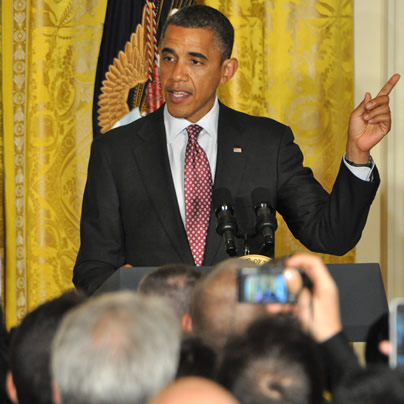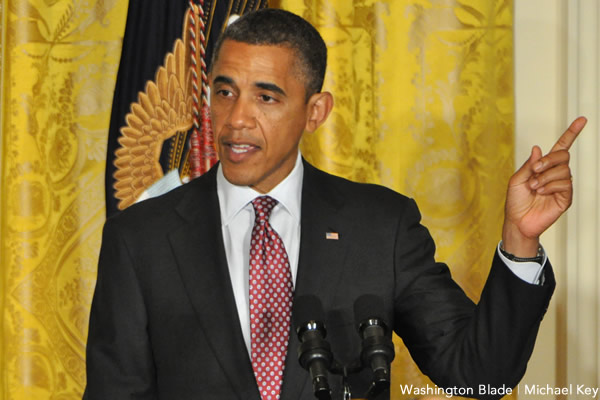National
Obama touts LGBT achievements at White House reception
POTUS pledges to be LGBT advocate as long as he’s president

President Obama pledged at this year’s White House Pride reception that he’ll continue to be an advocate for the LGBT community for as long as he’s in the White House, calling on attendees to dream big and “as openly as you want.”
“And as long as I have the privilege of being your president, I promise you, you won’t just have a friend in the White House, you will have a fellow advocate — for an America where no matter what you look like or where you come from or who you love, you can dream big dreams and dream as openly as you want,” Obama said.
The reception comes near the conclusion of Obama’s first term — and he wasn’t shy about touting his pro-LGBT achievements over the past three-a-half years, including repeal of “Don’t Ask, Don’t Tell” and dropping defense of the Defense of Marriage Act in court. Repealing the military’s gay ban got the most applause from the audience; the runner up was dropping defense of DOMA in court.
One other significant action by Obama was also included in his remarks: his recent endorsement of marriage equality.
“And Americans may be still evolving when it comes to marriage equality — but as I’ve indicated personally, Michelle and I have made up our minds on this issue,” Obama said.
An estimated 500 people came to the event, which took place in the East Room of the White House. A military band welcomed guests. Attendees munched on hors d’oeuvres served on tables adorned with red and pink roses.
Those who came largely consisted of LGBT advocates from around the country and LGBT people who held important roles in the federal government. Among the attendees were openly gay members of the Obama administration, including Office of Personnel Management Director John Berry, chair of the Export-Import Bank Fred Hochberg and chair of the Council on Environmental Quality Nancy Sutley. Also on hand: Gavin Newsom, lieutenant governor of California; gay actor Matt Bomer; and gay MSNBC anchor Thomas Roberts.
Obama noted that his administration has seen many achievements on LGBT rights as he encouraged attendees to continue pressing forward
“After decades of inaction and indifference, you have every reason and right to push, loudly and forcefully, for equality,” Obama said. “But three years ago, I also promised you this: I said that even if it took more time than we would like, we would see progress, we would see success, we would see real and lasting change. And together, that’s what we’re witnessing.”
Another success that Obama mentioned was the lifting of the HIV travel ban. The president acknowledged this action has enabled D.C. to host the International AIDS Conference in July — marking the first time the United States has hosted the conference since 1990.
While touting his accomplishments, Obama said “we’ve got more to do” and identified two LGBT issues that he said still need to be addressed further: passage of the Employment Non-Discrimination Act and bullying in schools.
“Americans may feel more comfortable bringing their partners to the office barbecue, but we’re still waiting for a fully inclusive Employment Non-Discrimination Act,” Obama said. “Congress needs to pass that legislation, so that no American is ever fired simply for being gay or transgender.”
The reception marks the fourth time that Obama has hosted a Pride reception at the White House. In each of the three previous years of his administration, the president has held a reception to commemorate June as Pride month.
This year’s Pride reception marks the first time openly gay service members participated while in uniform. A handful wearing uniforms from the various military branches could be seen mingling in the crowd, although they declined to talk to reporters during the event.
Josh Seefried, co-director of OutServe, was among the active duty service members who participated and said afterward he was proud to attend.
“I was incredibly proud to be there not only with the people we worked side by side with to repeal ‘Don’t Ask, Don’t Tell’ but for the first time with my military peers as well,” Seefried said. “It was surreal.The president’s speech showed leadership from the top and I’m proud to call him my commander-in-chief.”
Numerous attendees told the Washington Blade at the event they were thrilled to receive invitations and show their support for Obama as Election Day approaches.
Mark Segal, publisher of the Philadelphia Gay News, said it’s important for the LGBT community to work to re-elect Obama after he took a political risk by coming out for marriage equality.
“I think it’s interesting that’s he taken such a major chance in support for this community, and I hope this community answers that challenge,” Segal said.
Mary Burns, executive director of the Indianapolis, Ind., based Indiana Youth Group, said she was “ecstatic” to attend the reception and doesn’t know anyone else who’s been invited to the White House.
“Just because we got invited, we’re celebrities in Indianapolis,” Burns said. “It’s very significant to us. We’re fighting a constitutional amendment [against marriage equality] in Indiana, and so the fact that we can come to the White House for a reception just says that the government isn’t all against us.”
Attendees at the event universally said they don’t believe presumptive Republican presidential nominee Mitt Romney would host a similar Pride event if he’s elected to the White House.
Michael Rogers, a gay D.C. activist and another attendee at the reception, said he doubts there would be any LGBT advances under a Romney administration.
“He’s so bound to the right-wing, especially in a first term that you just won’t see anything,” Rogers said. “You’ll see his social policy pushed off on some right-winger and [Romney will] care about destroying the economy. What they want to create is apartheid; they want to hold all the money for the rich, white people when more and more the country is becoming people of color and more diversity.”
Rep. Jerrold Nadler (D-N.Y.), one of the members of Congress who was in attendance, expressed satisfaction with Obama’s inclusion of marriage equality in his speech — but was particularly happy Obama mentioned a trans-inclusive ENDA in his remarks.
“A few years ago, there was a major rift in the Democratic caucus, and in the gay community,” Nadler said. “When we put a bill on the floor for ENDA, it was not inclusive, and you wouldn’t do that today. Compare that a few years ago to today, when the president specifically mentioned an inclusive ENDA, and the president specifically comes out in favor of repealing DOMA and in favor of marriage equality. That’s tremendous change.”
Some LGBT advocates used the occasion of the White House Pride reception to press Obama to take administrative action against workplace discrimination against LGBT people.
Jacob Tobia, a gay 20-year-old student from Duke University, sought to deliver a letter to Obama calling on him to issue an executive order requiring federal contractors to have non-discrimination policies based on sexual orientation and gender identity. In April, the White House announced it wouldn’t issue such a directive at this time, but advocates have continued to press the administration.
Tobia, director of LGBTQ Policy for Duke student government, said he spoke briefly with the president following his remarks, but the message was taken by an aide.
“I don’t know if it’ll actually get to the president; I hope it will,” Tobia said. “But I shook his hand and got to say, ‘Mr. President, I wrote you a letter about the executive order, and I hope you’ll get a chance to read it.’ He said, ‘OK.'”
Tobia said he feels the executive order would help him personally because he resides in a state with no law protecting LGBT people against discrimination.
“It’s a very good possibility that I could be working in my home state and someone could give me my two weeks and say, ‘You’re fired,’ because I’m gay,” Tobia said. “With the job market the way it is, it’s really scary that I could be fired from my job just for being gay.”
The reception took place on the same day that Obama issued an executive order along the lines of the DREAM Act to protect young, undocumented immigrants pursuing college education or military service from deportation. According to the Associated Press, a few hundred young people rallied before the White House in support of the move before the reception started.
National
Supreme Court deals blow to trans student privacy protections
Under this ruling, parents are entitled to be informed about their children’s gender identity at school, regardless of state protections for student privacy.

The Supreme Court on Monday blocked a California policy that allowed teachers to withhold information about a student’s gender identity from their parents.
The policy had permitted California students to explore their gender identity at school without that information automatically being disclosed to their parents. Now, educators in the state will be required to inform parents about developments related to a student’s gender identity, depending on how the case proceeds in lower courts.
The case involves two sets of parents — identified in court filings as John and Jane Poe and John and Jane Doe — both of which say their daughters began identifying as boys at school without their knowledge, citing religious objections to gender transitioning.
The Poes say they only learned about their daughter’s gender dysphoria after she attempted suicide in eighth grade and was hospitalized. After treatment for the attempt and after being returned to school the following year, teachers continued using a male name and pronouns despite the parents’ objections, citing California law. The Poes have since placed their daughter in therapy and psychiatric care.
Similarly, the Does say their daughter has intermittently identified as a boy since fifth grade, but while their daughter was in seventh grade, they confronted school administrators over concerns that staff were using a male name and pronouns without informing them. The principal told them state law barred disclosure without the child’s consent.
Both sets of parents filed lawsuits in the U.S. District Court for the Southern District of California challenging the state policy that protects students’ gender identity and limits when schools can disclose that information to parents.
The justices voted along ideological lines, with the court’s six conservative members in the majority and the three liberal justices dissenting.
“We conclude that the parents who seek religious exemptions are likely to succeed on the merits of their Free Exercise Clause claim,” the court said in an unsigned order. “The parents who assert a free exercise claim have sincere religious beliefs about sex and gender, and they feel a religious obligation to raise their children in accordance with those beliefs. California’s policies violate those beliefs.”
In dissent, the three liberal justices argued that the case is still working its way through the lower courts and that there was no need for the high court to intervene at this stage. Justice Elena Kagan wrote, “If nothing else, this Court owes it to a sovereign State to avoid throwing over its policies in a slapdash way, if the Court can provide normal procedures. And throwing over a State’s policy is what the Court does today.”
Conservative Justices Samuel Alito and Clarence Thomas indicated they would have gone further and granted broader relief to the parents and teachers challenging the policy.
The emergency appeal from a group of teachers and parents in California followed a decision from the United States Court of Appeals for the Ninth Circuit that allowed the state’s policy to remain in effect. The appeals court had paused an order from U.S. District Judge Roger Benitez — who was nominated by George W. Bush — that sided with the parents and teachers and put the policy on hold.
The legal challenge was backed by the Thomas More Society, which relied heavily on a decision last year in which the court’s conservative majority sided with a group of religious parents seeking to opt their elementary school children out of engaging with LGBTQ-themed books in the classroom.
California Attorney General Rob Bonta expressed disappointment with the ruling. “We remain committed to ensuring a safe, welcoming school environment for all students while respecting the crucial role parents play in students’ lives,” his office said in a statement.
The decision comes as the Trump administration has taken a hardline approach to transgender rights. During his State of the Union address last week, President Donald Trump referenced Sage Blair, who previously identified as transgender and later detransitioned, describing Blair’s experience transitioning in a public school. According to the president, school employees supported Blair’s chosen gender identity and did not initially inform Blair’s parents.

Last year, the court upheld Tennessee’s ban on gender-affirming medical care for transgender minors and has allowed enforcement of a policy barring transgender people from serving in the military to continue during Trump’s second term.

The Comings & Goings column is about sharing the professional successes of our community. We want to recognize those landing new jobs, new clients for their business, joining boards of organizations and other achievements. Please share your successes with us at [email protected].
Congratulations to Gil Pontes III on his recent appointment to the Financial Advisory Board for the City of Wilton Manors, Fla. Upon being appointed he said, “I’m honored to join the Financial Advisory Board for the City of Wilton Manors at such an important moment for our community. In my role as Executive Director of the NextGen Chamber of Commerce, I spend much of my time focused on economic growth, fiscal sustainability, and the long-term competitiveness of emerging business leaders. I look forward to bringing that perspective to Wilton Manors — helping ensure responsible stewardship of public resources while supporting a vibrant, inclusive local economy.”
Pontes is a nonprofit executive with years of development, operations, budget, management, and strategic planning experience in 501(c)(3), 501(c)(4), and political organizations. Pontes is currently executive director of NextGen, Chamber of Commerce. NextGen Chamber’s mission is to “empower emerging business leaders by generating insights, encouraging engagement, and nurturing leadership development to shape the future economy.” Prior to that he served as managing director of The Nora Project, and director of development also at The Nora Project. He has held a number of other positions including Major Gifts Officer, Thundermist Health Center, and has worked in both real estate and banking including as Business Solutions Adviser, Ironwood Financial. For three years he was a Selectman, Town of Berkley, Mass. In that role, he managed HR and general governance for town government. There were 200+ staff and 6,500 constituents. He balanced a $20,000,000 budget annually, established an Economic Development Committee, and hired the first town administrator.
Pontes earned his bachelor’s degree in political science from the University of Massachusetts, Dartmouth.
Kansas
ACLU sues Kansas over law invalidating trans residents’ IDs
A new Kansas bill requires transgender residents to have their driver’s licenses reflect their sex assigned at birth, invalidating current licenses.

Transgender people across Kansas received letters in the mail on Wednesday demanding the immediate surrender of their driver’s licenses following passage of one of the harshest transgender bathroom bans in the nation. Now the American Civil Liberties Union is filing a lawsuit to block the ban and protect transgender residents from what advocates describe as “sweeping” and “punitive” consequences.
Independent journalist Erin Reed broke the story Wednesday after lawmakers approved House Substitute for Senate Bill 244. In her reporting, Reed included a photo of the letter sent to transgender Kansans, requiring them to obtain a driver’s license that reflects their sex assigned at birth rather than the gender with which they identify.
According to the reporting, transgender Kansans must surrender their driver’s licenses and that their current credentials — regardless of expiration date — will be considered invalid upon the law’s publication. The move effectively nullifies previously issued identification documents, creating immediate uncertainty for those impacted.
House Substitute for Senate Bill 244 also stipulates that any transgender person caught driving without a valid license could face a class B misdemeanor, punishable by up to six months in jail and a $1,000 fine. That potential penalty adds a criminal dimension to what began as an administrative action. It also compounds the legal risks for transgender Kansans, as the state already requires county jails to house inmates according to sex assigned at birth — a policy that advocates say can place transgender detainees at heightened risk.
Beyond identification issues, SB 244 not only bans transgender people from using restrooms that match their gender identity in government buildings — including libraries, courthouses, state parks, hospitals, and interstate rest stops — with the possibility for criminal penalties, but also allows for what critics have described as a “bathroom bounty hunter” provision. The measure permits anyone who encounters a transgender person in a restroom — including potentially in private businesses — to sue them for large sums of money, dramatically expanding the scope of enforcement beyond government authorities.
The lawsuit challenging SB 244 was filed today in the District Court of Douglas County on behalf of anonymous plaintiffs Daniel Doe and Matthew Moe by the American Civil Liberties Union, the ACLU of Kansas, and Ballard Spahr LLP. The complaint argues that SB 244 violates the Kansas Constitution’s protections for personal autonomy, privacy, equality under the law, due process, and freedom of speech.
Additionally, the American Civil Liberties Union filed a temporary restraining order on behalf of the anonymous plaintiffs, arguing that the order — followed by a temporary injunction — is necessary to prevent the “irreparable harm” that would result from SB 244.
State Rep. Abi Boatman, a Wichita Democrat and the only transgender member of the Kansas Legislature, told the Kansas City Star on Wednesday that “persecution is the point.”
“This legislation is a direct attack on the dignity and humanity of transgender Kansans,” said Monica Bennett, legal director of the ACLU of Kansas. “It undermines our state’s strong constitutional protections against government overreach and persecution.”
“SB 244 is a cruel and craven threat to public safety all in the name of fostering fear, division, and paranoia,” said Harper Seldin, senior staff attorney for the ACLU’s LGBTQ & HIV Rights Project. “The invalidation of state-issued IDs threatens to out transgender people against their will every time they apply for a job, rent an apartment, or interact with police. Taken as a whole, SB 244 is a transparent attempt to deny transgender people autonomy over their own identities and push them out of public life altogether.”
“SB 244 presents a state-sanctioned attack on transgender people aimed at silencing, dehumanizing, and alienating Kansans whose gender identity does not conform to the state legislature’s preferences,” said Heather St. Clair, a Ballard Spahr litigator working on the case. “Ballard Spahr is committed to standing with the ACLU and the plaintiffs in fighting on behalf of transgender Kansans for a remedy against the injustices presented by SB 244, and is dedicated to protecting the constitutional rights jeopardized by this new law.”
-

 India5 days ago
India5 days agoActivists push for better counting of transgender Indians in 2026 Census
-

 Advice5 days ago
Advice5 days agoDry January has isolated me from my friends
-

 District of Columbia5 days ago
District of Columbia5 days agoCapital Pride reveals 2026 theme
-

 National5 days ago
National5 days agoAfter layoffs at Advocate, parent company acquires ‘Them’ from Conde Nast




















